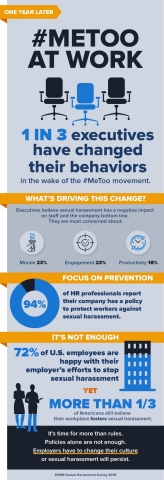ALEXANDRIA, Va.--(BUSINESS WIRE)--One year ago, the news of Harvey Weinstein broke and the #MeToo movement sparked a nationwide conversation. Since then one-third of executives have altered their actions to avoid behaviors that could be perceived as sexual harassment, according to new data from SHRM, the Society for Human Resource Management.
Infographic: #MeToo at Work
These changes in behavior have resulted as executives witness how sexual harassment affects staff and the company bottom line. They rate the biggest impacts as:
- Decreased morale (cited by 23 percent),
- Decreased engagement (23 percent),
- Decreased productivity (18 percent),
- Increased hostile work environment (15 percent),
- and Increased turnover (13 percent).
And while 72 percent of employees said they were satisfied with their company’s efforts to stop sexual harassment in the workplace, more than one-third still believe their workplace fosters sexual harassment.
“The fact that some workplace cultures still foster sexual harassment says there is more work to be done,” said Johnny C. Taylor, Jr., SHRM-SCP, president and CEO of SHRM. “We need a rules-plus approach – organizations need policies and training, but it is the education piece that creates culture change. When you have employees who know how to define, identify and report sexual harassment, everyone can work together to root out sexual harassment in the workplace.
“As a cultural change metric in such a short time, having a third of executives report changed behavior is significant,” Taylor said. “Yet, we can’t let the pendulum swing too far. Organizations must be careful not to create a culture of ‘guilty until proven innocent’ and we cannot tolerate other unintended consequences.
“One troubling trend is executives going as far as to not invite female colleagues on business trips, to evening networking events or into their inner circles to avoid any situation that could be perceived incorrectly, thus reducing the opportunity for women.”
Additionally, executives surveyed believe that the most effective ways to influence workplace culture to stop sexual harassment and foster a safe environment are:
- Enhancing HR’s ability to investigative allegations without retaliation (cited 45 percent),
- Conducting independent reviews of all workplace misconduct investigations (44 percent), and
- Increasing diversity in leadership roles (39 percent).
“At its core, an organization must have the right culture to self-police,” Taylor continued. “We have a long road to go, but positive strides have been made.”
Addressing Workplace Harassment: A conversation starter
Methodology:
In 2018, employees, including executives, managers and non-managers representing more than 15 industries, were surveyed by Research Now on behalf of SHRM. The margin of error was plus or minus 3.1 percentage points.
Media: SHRM President and CEO Johnny C. Taylor, Jr. is available for interviews on this topic. To schedule an interview, contact Vanessa Hill at 703-535-6072 and Vanessa.Hill@shrm.org or Kate Kennedy at 703-535-6260 and Kate.Kennedy@shrm.org.
About the Society for Human Resource Management
The Society for Human Resource Management (SHRM) is the world’s largest HR professional society, representing 300,000 members in more than 165 countries. For nearly seven decades, the Society has been the leading provider of resources serving the needs of HR professionals and advancing the practice of human resource management. SHRM more than 575 affiliated chapters within the United States and subsidiary offices in China, India and United Arab Emirates. Visit us at shrm.org and @SHRM.




